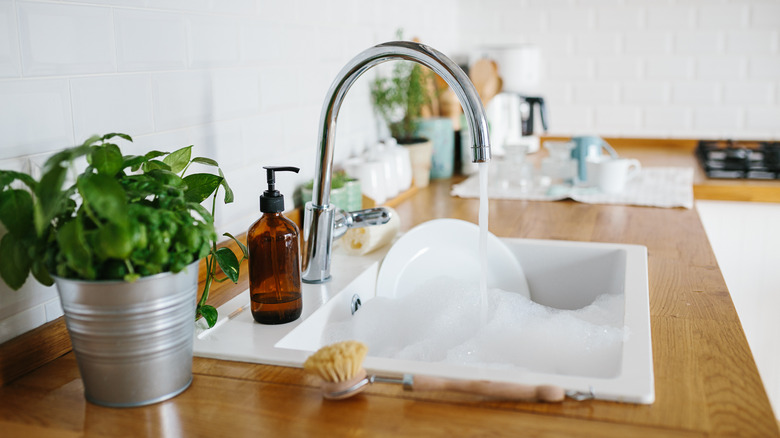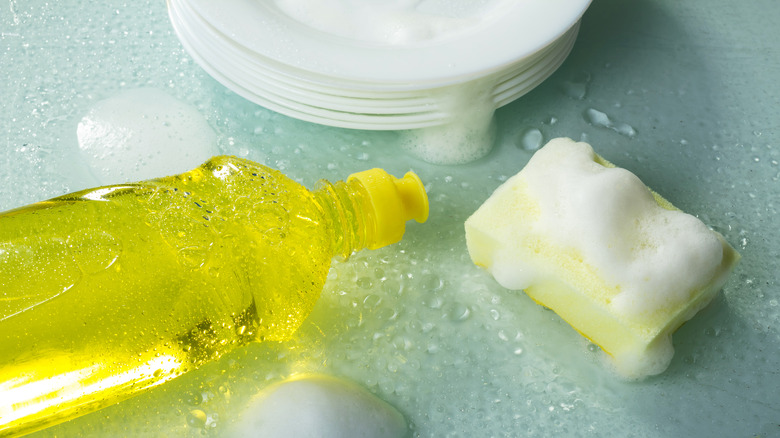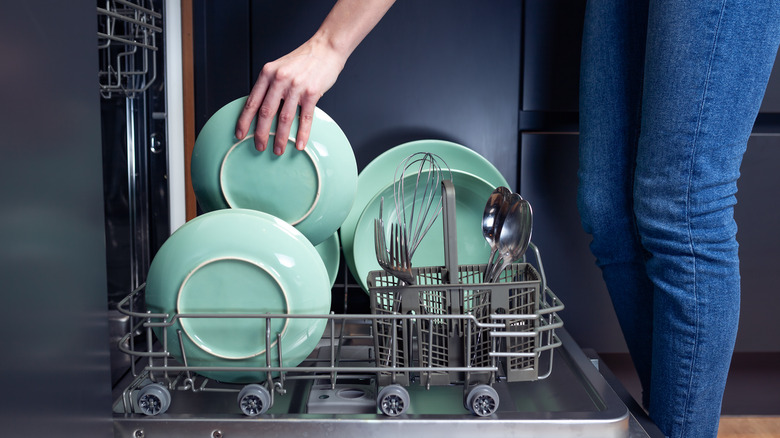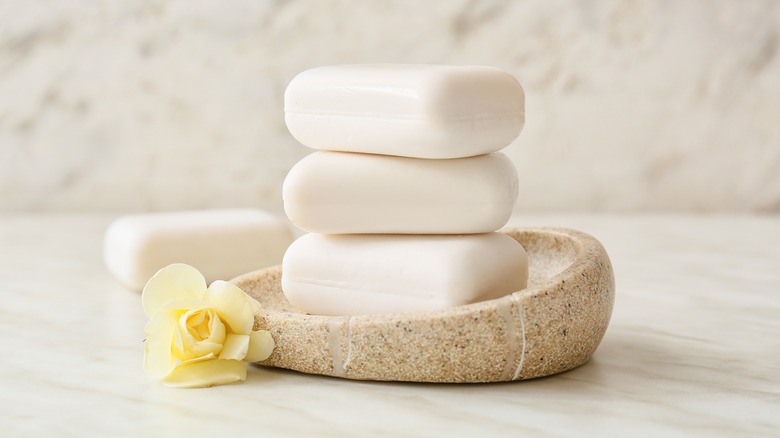Here's What You Can Substitute For Dish Soap
Picture this: You have guests coming over in 30 minutes, a sink full of dirty dishes — and zero dish soap or dishwasher detergent. Don't panic. You probably have something under your sink or in your pantry that will serve as a substitute in a pinch. In fact, some of these alternatives might become your favorite go-to's.
And you definitely want to make sure you're using something besides just water. That's because research has found that some of the dirtiest, germiest places in the home are in the kitchen. The worst culprits? Your kitchen sponge and dishcloths. A survey by University of Arizona microbiologist Dr. Charles Gerba found that of 1,000 sponges and dishcloths tested, 10% contained salmonella (via Food & Wine). Your kitchen sink is also a hotspot for bacteria, including E. coli, because it feeds off the scraps of food in the drain and on unwashed dishes.
Fortunately, the following substitutes for dish soap and detergent use everyday household items that'll still give you a good clean.
These everyday essentials can replace dish soap
The good news is that you're likely to have the majority of these dish soap substitutes in your home already. The first one is baking soda. It's made of sodium bicarbonate, which neutralizes odors and absorbs grease when mixed with water, according to Apartment Therapy. Make a dish-scrubbing paste by mixing half a cup of baking soda with a few tablespoons of water. Then, put on a pair of gloves, use very hot water, and scrub dishes with the paste to clean and disinfect.
If you're a fan of liquid castile soap, the vegetable-based multitasking soap (like the famous Dr. Bronner's), you're in luck. It not only works in your shower but on dishes (per SF Gate). In a bottle, combine one part water with four parts castile soap, and stir. Shake before using just like your normal dish soap.
Another bathroom essential can help you tackle those dirty dishes: Everyday shampoo is just as effective at washing dishes as it is at washing hair, according to Cosmopolitan. But what about if you want to run your dishwasher?
Your kitchen already contains dishwasher detergent alternatives
If you run out of dishwasher detergent, there are plenty of ordinary household substitutes at hand for that, too. A great alternative is distilled white vinegar, which tackles grease thanks to its acid content (via The Spruce). But don't put it in the detergent cup. Instead, pour half a cup of vinegar into a bowl, and carefully place it on the top rack. The wash cycle will disperse the grease-busting vinegar throughout the machine to the other dishes inside and clean them. Don't have any vinegar? Lemon juice can be used the same way, thanks to its natural acids.
Amazingly, if you only have powdered lemonade in your pantry, that can also clean dishes. Pour the powder into the detergent cup up to the rim, and run the washing cycle like normal. Another everyday essential you can pour into the detergent cup is borax. This natural mineral cleaner is a common ingredient in dish detergent and will work just as well to bust grease on dishes. Voila! Job well done.
What not to use
You should, however, also be aware of what not to use. Just because something is considered soap doesn't mean it's safe to use for your dishes — especially if it's not safe to ingest.
Laundry detergent may seem like an easy enough swap for dish soap, for example, but In The Wash strongly advises against it. This is because laundry soap contains chemicals to whiten and brighten your clothes, as well as scents and fragrances, and these should never be ingested. In an emergency, In The Wash says that hand soap and bar soap could be fine alternatives, but never for your dishwasher, as they produce too many suds. Also, make sure all the soap is thoroughly rinsed off before using any of the items.
Don't use liquid body wash, either, warns Kitchen Buds. Body wash has lots of fragrances that not only shouldn't be ingested but will likely ruin the taste of your food. It's also a gentler soap, so as to not irritate your skin. For dishes, though, that means it won't be strong enough to degrease and disinfect. Finally, avoid all-purpose cleaners. Gimme the Good Stuff explains that most all-purpose cleaners have harsh chemicals like chlorine, fragrances, and bleach.



